In May 2023, Andy Gheorghiu travelled along the US Gulf coast and visited LNG export sites (operating, under construction and planned) which have been co-financed by German banks or enabled through longterm contracts with German companies. He wanted to learn first-hand about the impacts on local communities and the environment. Lots of what he has experienced and heard reminded him of issues one would have expected in the Global South. Part 1 of these series looked at LNG export sites and impacted communities in Texas. This one covers Louisiana.
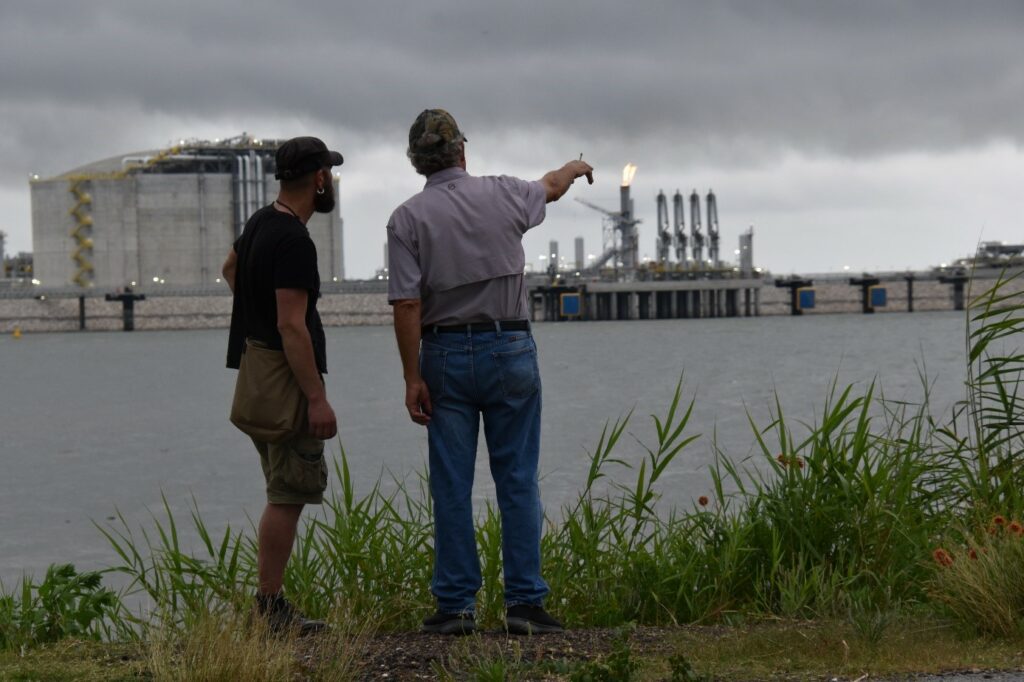
Flaring operations at the Calcasieu Pass facility of Venture Global. The author with Venture’s next door neighbor John Allaire. Credits: Constantin Zerger, Deutsche Umwelthilfe, All Rights Reserved.
Calcasieu Pass (May 8)
The first stop in Louisiana is on the property of John Allaire in Louisiana’s wetlands – a few hundred metres away from the Gulf of Mexico. John could actually live off the rich biodiverse land. It would be paradise – if it wasn’t for its hellish neighbour. Not far away lies Venture Global’s Calcasieu Pass LNG export terminal. John has documented the constant flaring operations from the site and has reported them to the Federal Energy Regulatory Commission (FERC). Flaring at LNG facilities is often used as an emergency mechanism during shutdowns or operational problems.
In a January 2023 report, the NGO Louisiana Bucket Brigade documented significant operational problems at the existing Calcasieu Pass (CP1) LNG export terminal. Venture Global has failed to properly report emissions and accidents that have occured regularly since operations began in 2022. In the 133 days of operations, 91 days were documented between January and May 2022 where gas was flared and pollutants were emitted into the environment. Five accidents were reported to the Louisiana Department of Environmental Quality during this period. The company was found not to be in full compliance with its reporting requirements. Local fishermen complain about the impact of the entire proposed gas export expansion in the region. They argue that it would severely endanger their livelihoods and seafood industry.
The operator of the Calcasieu Pass export terminal, Venture Global, has signed a 20 year longterm LNG supply contract (including a 10-year extension option) with the German company EnBW who plans to import fracked gas from 2026 onwards. Venture Global also signed a 20-year deal to provide Securing Energy for Europe (SEFE, formerly Gazprom Germania – now owned by the German state) with 3 bcm per annum of LNG – turning Venture Global into Germany’s largest supplier of fracked gas. The company wants to deliver supplies from the Calcasieu Pass 2 project – an extension of the existing export terminal. The fulfilment of the contracts relies on the construction of LNG import terminals in Germany (in particular onshore terminal in Stade), the expansion of Calcasieu Pass and the realization of the Plaquemines LNG export terminals.
Venture Global made the final investment decision for Plaquemines LNG export terminal on March 13th, 2023, shortly after meeting with the German chancellery. Lenders for the project include Deutsche Bank, LBBW, KfW IPEX-Bank, Helaba and DZ Bank.
Groups from Louisiana have filed an objection against the permitting of the onshore import terminal at Stade, Germany.
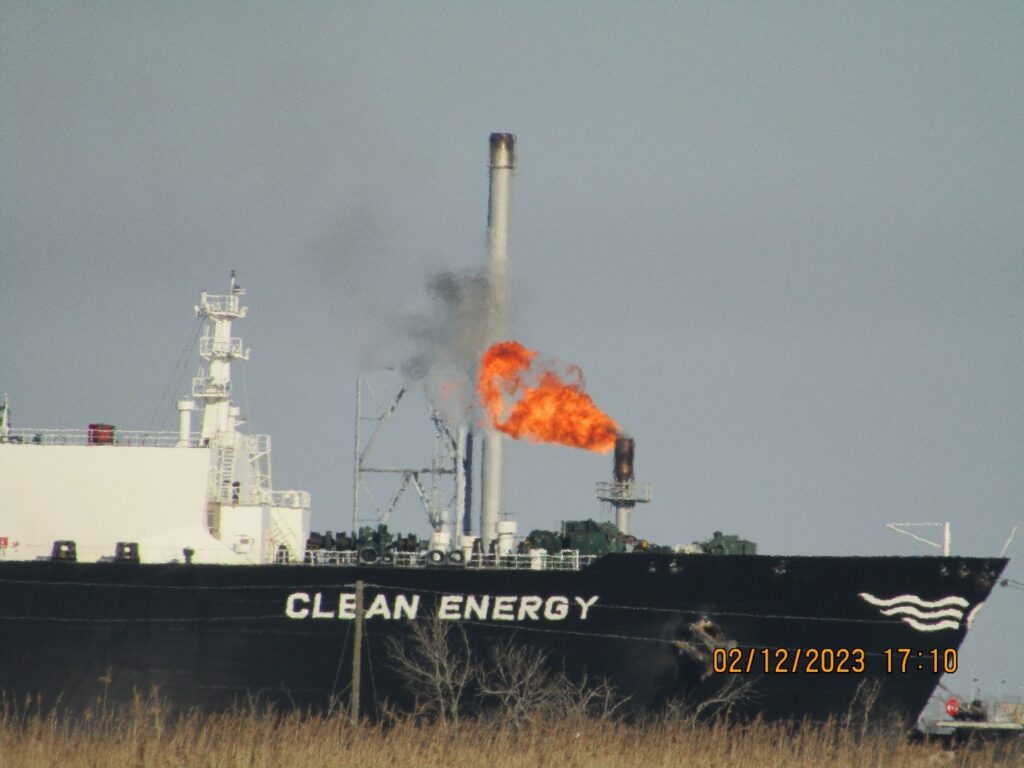
Flaring at Venture Global’s Calcasieu Pass export terminal. Credits: John Allaire, All Rights Reserved.
Commonwealth LNG – though not pushed forward by Venture Global – is another proposed LNG export terminal which is planned to be built next door to John Allaire’s property – destroying more precious wetlands in an area that has already been hit by severe hurricanes over the past decade.
Lake Charles (May 9)
Lake Charles is yet another cluster of petrochemical and LNG export facilities. James Hiatt from Better Bayou and Roishetta Ozane from the Vessel Project take us on a tour that reveals the deep roots of environmental racism and structural pollution in an area. The health risks and other impacts mainly impact marginalized communities who are forced to live in so-called sacrifice zones.
Visiting Cameron LNG is also eye-opening. It is being operated by Sempra Infrastructure (a co-contractor with German company RWE) and faces similar issues like Calcasieu Pass. Since operations began in 2019, 67 spills releasing pollutants or methane emissions to the atmosphere have been documented at the Cameron LNG terminal. The terminal is also at risk from Louisiana’s extreme weather. As a result of Hurricane Laura in 2020, operations had to be suspended. High winds also led to greenhouse gas leaks in 2021. The state of Louisiana sent four warning letters to the operator, Sempra but, so far, the failures have not been corrected, nor has the company’s misconduct had any other consequences. Cameron LNG has been co-financed by German banks (BayernLB, Deutsche Bank and Helaba).
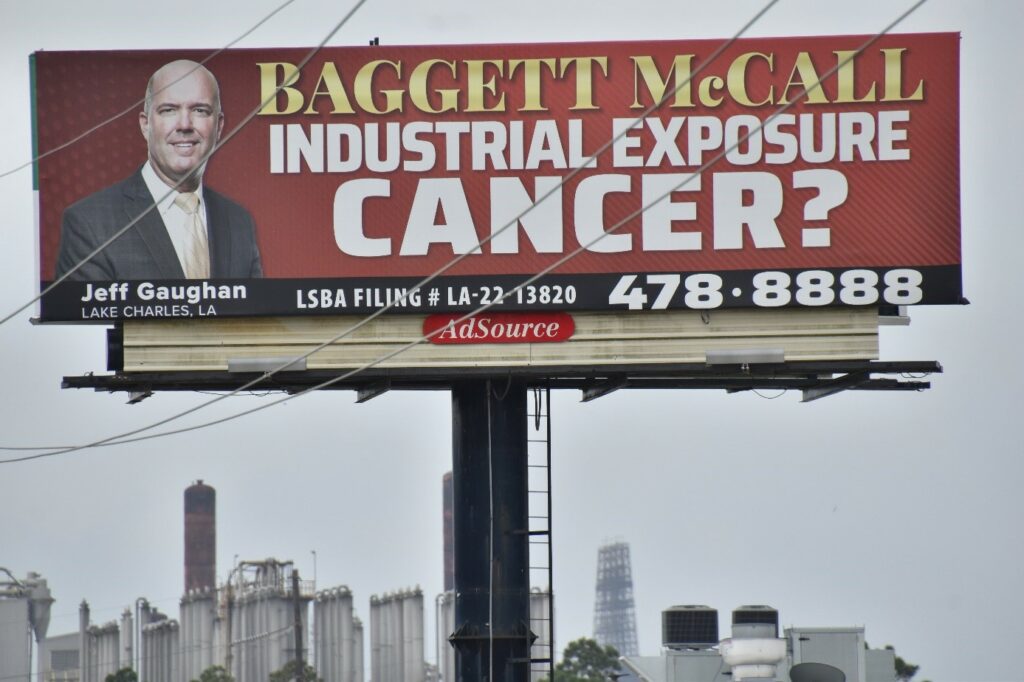
Advertisement of an attorney in Lake Charles. Credits: Constantin Zerger, Deutsche Umwelthilfe, All Rights Reserved.
We learn from Roishetta and James, that LNG does not offer a sustainable future for Louisiana. It is an environmental justice issue. However, expansion is underway, and fast: According to the FERC, 27 export terminals are under construction (including expansion projects at existing LNG terminals). Construction of this infrastructure threatens wetlands in a total area equal to about half of Washington, D.C. Wetlands are sites of high biodiversity and mitigate the effects of hurricanes. In the US as a whole, the most threatened wetlands are in Louisiana.
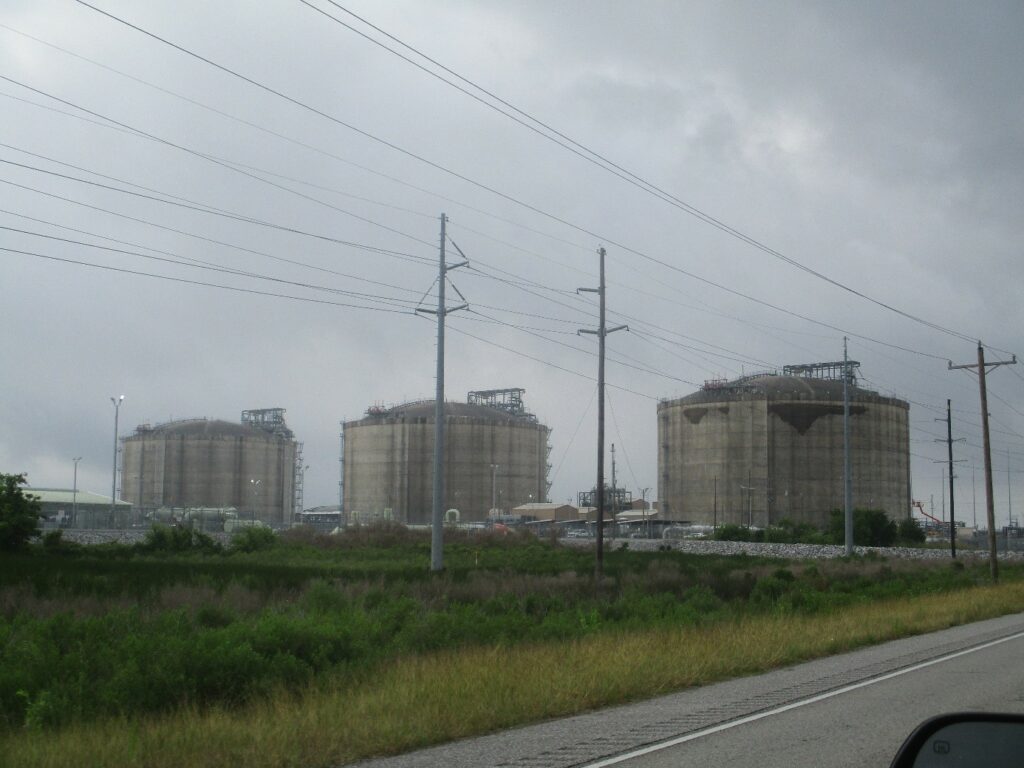
Cameron LNG export facility. Credits: Andy Gheorghiu, All Rights Reserved.
The irreversible destruction of the rich wetlands through the construction of fossil fuel infrastructure impacts nearby communities and their culture. Roishetta and James highlight though that – because of the linkages between companies and banks and because of the significant impact of LNG on climate change – the current build-out on both sides of the Atlantic and beyond is a global issue.
James Hiatt, founder Better Bayou [statement recorded during the tour nearby Calcasieu Pass LNG export facility]:
“The coast of the Gulf of Mexico is already eroding and now we are trying to pump more greenhouse gases into the atmosphere to compound the already eroding coast with sea level rise. We cannot afford to have any more gas export terminals built on this coast. Not the Calcasieu Pass one that is already here or the three other ones that they have planned right in this area. Enough is enough. We are calling on all the banks and all the people around the world to come together and realize our interdependency is the only thing that can break our dependency from fossil fuels.”
Plaquemines (May 10)
The final investment decision for Venture Global’s Plaquemines LNG export terminal was enabled by the longterm contracts signed with the German companies EnBW and SEFE and by loans provided by the international arm of the German state-owned bank KfW Ipex and BayernLB (the bank owned by the German federal state of Bavaria).
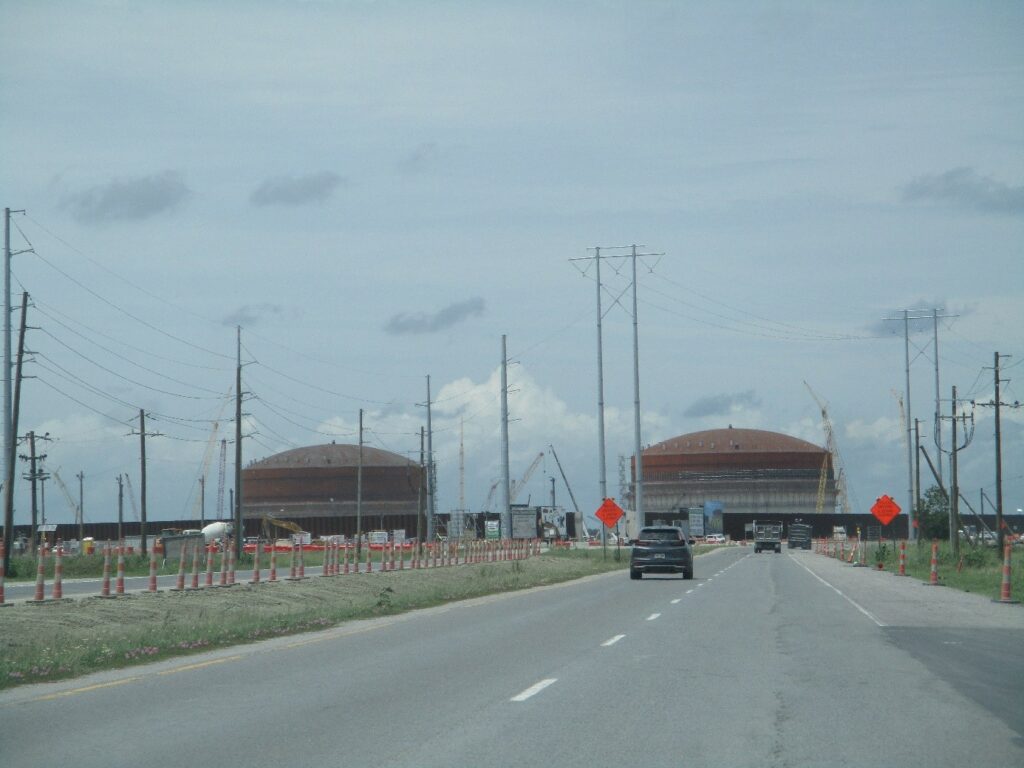
Plaquemines LNG construction site, Louisiana. Credits: Andy Gheorghiu, All Rights Reserved.
Bishop Johnson from the Plaquemine parish shared his concerns about the project which is being built in a flood-risk zone (far beyond the safety gates that are meant to protect the community in increasingly frequent floods). He foresees negative consequences for the black community which is already preparing for more hurricanes and flooding as the planet warms.
Roishetta Ozane, co-founder of the Vessel Project, Louisiana [statement recorded during the tour nearby Cameron LNG export terminal]:
“LNG is not a sustainable future for South-West Louisiana. In fact, it’s an environmental justice issue. When we have big facilities coming here building on our wetlands, building on the places where we love to fish, where we love to crab and look for crawfish, then that impacts each of us. This is not just a Louisiana issue. This is not just a South-West Louisiana issue. This is a global issue. We need everyone to come together to help us fight against these dangerous infrastructures that is coming to our communities, poisoning our air, poisoning our water and causing us harm.”
Conclusion
Over the past decade, German banks have provided some €4.5 billion in loans for the construction of US LNG export terminals. Between January 2022 and April 2023 alone, support from German banks added up to €2.6 billion.
In addition, long-term supply contracts have been signed between US LNG operators and German companies. Most deliveries are scheduled to start in 2026 or 2027 and will run for up to 20 years. This stands in clear contradiction to Germany’s goal of achieving climate neutrality by 2045. Not only do these investments and contracts fuel climate-wrecking fracking, but they contribute to the human rights violations related to fossil fuel extraction, LNG/petrochemicals production and transport.
Significantly, Indigenous people, people of colour, Latinos, and low-income communities living near LNG export terminals bear the brunt of any impacts – things, one could expect to find in the Global South but I did not expect to bump into seemingly structural human rights violations issue in one of the “flagship countries” of Global North democracies.
Amid mounting risks of illness and environmental degradation, every bank and company involved in these projects and every state supporting this development should be held responsible for their role in pollution and global warming – as well as the ongoing violation of basic human rights.